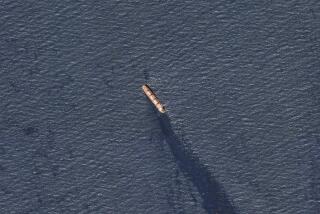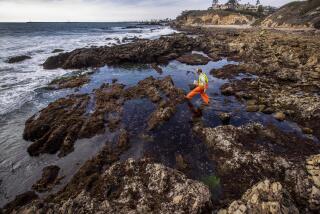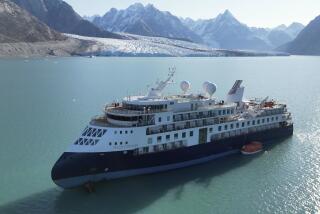Arctic shipping is disaster waiting to happen, safety group warns
Ferrying a load of soybeans from Seattle to China in 2004, the engine of Malaysian freighter Selendang Ayu lost power and the vessel broke in half on rocks off Unalaska Island in the middle of the Alaskan archipelago.
A ferocious Bering Sea storm thwarted rescue efforts, resulting in the loss of six crew members, and the vessel spilled 350,000 gallons of heavy fuel oil. The oozing fuel killed thousands of seabirds, closed local fishing and contaminated miles of shoreline -- all inside the sensitive habitat of the Alaska Maritime National Wildlife Refuge.
On the eight anniversary of the spill, a coalition of shipping-safety and environmental organizations is calling for stationing ocean rescue tugs along the remote archipelago, continuous tracking of shipping traffic in the region and other improvements to avoid a similar disaster.
As many as 20 freighters and tankers a day follow the North Pacific Great Circle Route across the Aleutians between North America and Asia. Traffic continues to soar as Arctic sea ice recedes, including a 10-fold increase in use of the Northern Sea Route across the Russian Arctic, said Rick Steiner, a facilitator of the Shipping Safety Partnership.
“It’s only a matter of time before the next disaster happens,” Steiner said, noting these areas have among the roughest seas in the world.
A few steps have been taken since the 2004 spill, such as adding new ship-tracking stations, but it’s far from enough, according to the coalition, which is calling for tracking of all cargo vessels in the region. It said those vessels are often are foreign-flagged and lacking in safety standards.
As of now, not one powerful ocean rescue tug is stationed along the Aleutian route, the coalition said. By comparison, it noted, Alaska’s Prince William Sound has 11 escort-and-response tugs for its tankers since the Exxon Valdez spill created a national calamity.
The National Academy of Sciences reviewed Aleutian shipping safety in 2009 and concluded that efforts to salvage wrecks and clean up oil spills over the previous two decades had either been thwarted entirely by the weather or hampered to such a degree that “almost no oil had been recovered.”
For that reason, the academy in a 245-page report recommended shifting the focus to accident and spill prevention, including comprehensive tracking efforts, shipping restrictions in certain sensitive areas and the stationing of rescue tugs along shipping routes.
“None of the existing measures,” the academy concluded, “are adequate for responding to large vessels under severe weather conditions.”
ken.weiss@latimes.com






